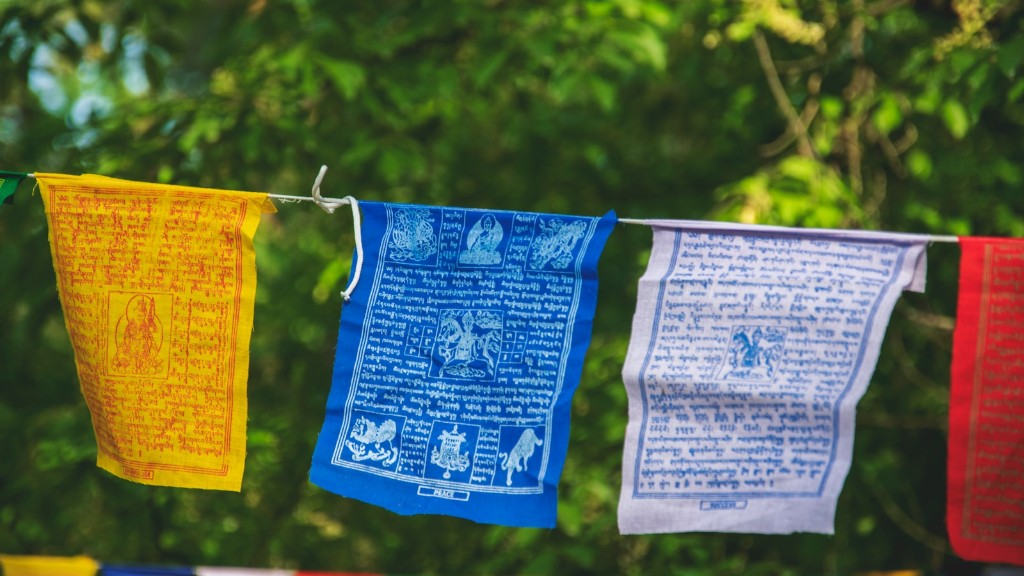History of Hinduism
Hinduism is one of the oldest known religions in the world, having its roots traceable back to at least 3,500 BCE. It is an amalgamation of diverse interpretations of religious thought, which can be linked to the Aryan and Dravidians civilizations that inhabited the Indian subcontinent. The Hindu beliefs on creation vary depending on the text or Upanishad, such as the Vishnu Purana or the Mahabharata, but they all agree that the world was created by Brahma, the God of all creation.
Unlike other ancient religions, Hindu beliefs have never been organized into a single, set of doctrines. Instead, different Hindu texts present multiple theories about how the world was created, though the underlying idea is that there is one universal reality and Brahman is an expression of it. Each text takes its own approach to explore the spiritual nature of the universe and its underlying principles.
According to the Hindu cosmology, the universe is cyclical, repeating itself in unmanifest and manifest forms. From the unmanifest form emerges a manifestation at the centre of the cosmic egg, known as the golden embryo, which contains all the potential in the universe. Brahma then creates the four surviving worlds and the six dvipas (continents) within them out of the golden embryo, and then creates the seven primal beings.
The gods of Hinduism are believed to have created the four surviving worlds by using the four heads of Brahma, and then went on to create the seven rishis and sages to guide and build the society within them. The four worlds are described as bhu (earth), bhuvar (atmosphere), svar (heaven) and mahar (the fourth world). According to various Hindu texts, these four surviving worlds are the principal planes of existence, with the netherworlds beneath them.
After populating the worlds with living beings, the gods gave each of them their unique characteristics and life spans. Each of these creations were molded according to a system of Dharma, which is believed to be the chief goal of all human existence. Dharma is the concept of proper conduct, involving loyalty and adherence to one’s values, duties, responsibilities and roles in society.
The creation story in Hinduism also explains that all objects, living and non-living, are connected and form part of the same reality. All souls are believed to have originated from one source and will one day be reunited with it. Hindus believe in a cyclical nature of existence with multiple temporal cycles, which explains why some organisms exist in multiple forms.
Furthermore, the idea of Maya, or illusion, is an important part of the creation story. According to this idea, the world is an illusion created by Vishnu in order to veil the true nature of Brahman. This further adds to the idea that the world we experience is not the ultimate truth and it is just part of a greater divine plan.
Importance of Dharma
The concept of Dharma is believed to be an important part of the Hindu creation story and is seen as the fundamental principle for maintaining harmony and balance in the universe. Hindu scriptures describe Dharma as an irrefutable cosmic law that binds everything together and determines a person’s place in society. All life forms are seen to be bound by Dharma, whether it is in the form of karmic cause and effect, or cosmic order and balance.
Dharma is also a key element in Hindu teachings, as it serves as a guidance system for achieving spiritual liberation and enlightenment. According to some Hindu texts, following the path of Dharma is the only path to true knowledge and understanding. Dharma is also believed to represent one’s individual meaning of life, as it is meant to provide structure and stability to one’s life.
Some Hindu texts also describe Dharma as showing the right way to think, speak, and act in various situations. Following the rules of Dharma prevents a person from causing any harm, either to themselves or to others. By upholding this code, Hindus believe that individuals can have a positive influence on the world and move closer to finding the true Brahman.
The concept of Dharma is known to be deeply ingrained in Indian society and culture, as it is seen as the ethical and moral backbone of a wide variety of religious practises and beliefs, such as Yoga and Ayurveda. Dharma is also known to be closely associated with the concept of karma, or the idea of cause and effect, which is a cornerstone of Hindu belief.
The concept of Dharma emphasizes a more holistic and mindful approach to life, as it encourages people to live in harmony with their environment, cultivate good relationships, and serve their communities. It provides an ethical foundation that Hindus strive to exemplify through their everyday actions and behaviours.
God Brahma
In Hinduism, Brahma is considered to be the Creator of the universe and is worshipped as the Supreme Being. Brahma is believed to have emerged from the cosmic egg, along with the four surviving worlds, and is seen as the first god in the Hindu trinity consisting of Brahma, Vishnu, and Shiva. Brahma is also known as the god of learning, knowledge, and understanding and is associated with the three texts known as the Vedas.
Hindus also believe that Brahma is the embodiment of truth, purity, and knowledge and is said to be above material desires and pleasure. He is seen as the source of all creation and is believed to have created the gods, planets, the cosmos, and humanity. In the Hindu creation story, Brahma is believed to have used his four heads to create the four surviving worlds, as mentioned in the Vedas.
According to some Hindu texts, Brahma is portrayed with four arms, each holding a book of sacred scriptures, such as the Vedas. In addition to this, Brahma is sometimes seen accompanied by a swan and is depicted in art and sculptures as seated, with a white beard and four faces, each facing in a different direction.
Brahma is also known as the Paramatman, which means the highest soul, and is believed by Hindus to be beyond the material world and even the cycles of birth-death. He is often seen as satisfying seeker’s spiritual needs and providing them with the strength and understanding to become complete and achieve liberation from samsara.
Furthermore, Brahma is known to be a symbol of hope and optimism in Hinduism, as he is believed to represent the true cosmic energy that has the power to bring harmony and balance to the universe. Hindus also believe that Brahma is the only eternal God in the trinity and is said to have created the other gods and goddesses.
Avatars of Vishnu
Vishnu is considered the preserver in Hinduism and is one of the main deities in the Hindu pantheon, along with Brahma and Shiva. Vishnu is believed to be an avatar of the supreme being, and his avatars are believed to have descended to the earth to restore order and peace. Vishnu’s avatars are believed to be an incarnation of him and each one is believed to have a different purpose and mission.
The most important of Vishnu’s avatars are considered to be the first four: Matsya (the fish), Kurma (the giant turtle), Varaha (the boar), and Narasimha (the half-man, half-lion). These four avatars are said to be related to the great flood which is said to have destroyed much of the world and recreated it. Other important avatars of Vishnu are Rama, Krishna, Buddha, and Kalki, each of whom is believed to have come to the earth to combat evil and uphold Dharma.
Hindus view Vishnu’s avatars as a symbol of hope and faith, as each one is believed to have brought about a golden age where righteousness and justice reigns. Each of Vishnu’s avatars are also said to have unique attributes and weapons which allow them to combat evil forces. For example, Rama is said to have been bestowed with the magical bow of Vishnu, while Krishna is thought to have wielded the powerful Sudarshana chakra.
The stories of the avatars of Vishnu are known to be very popular in Hindu mythology and have been told in various Hindu texts, such as the Mahabharata and the Ramayana. Through these stories, Hindus have come to understand the presence of the Divine in all aspects of life, and have learnt to trust that, no matter what happens, God is always there to protect and guide them.
Concept of Maya
The concept of Maya, or illusion, is an important part of the Hindu creation story and is closely associated with the notion of Brahman. Maya is believed to be an illusion that separates us from the true reality, and thus keeps us from understanding our true purpose in life. The Illusion of Maya is believed to keep us from seeing the greater cosmic harmony and understanding the true nature of reality.
Hindus believe that the only way to break free from Maya is by gaining spiritual knowledge and transcending the material world. In order to do this, one needs to focus on developing a spiritual and mindful approach to life, and continue to strive for enlightenment. This can be done through various spiritual activities and practices, such as prayers, meditation, and japa (mantra chanting).
Moreover, Hindus believe that Maya can also be combatted through karma which serves as a moral code of justice for life. Through engaging in good karma, Hindus are believed to be taking part in a cosmic order which will eventually free them from the cycle of rebirth. This is why Hindus strive to be moral, ethical, and virtuous and see their actions as being in alignment with greater cosmic balance.
Ultimately, Hinduism emphasises the importance of breaking free from the illusion of Maya in order to gain liberation and find true enlightenment. All forms of Hindu spiritual practices and traditions, such as Yoga, are seen to be essential tools in achieving this, as they help to cultivate a more mindful and enlightened approach to life.
Power of the Supreme Being
Hindus believe that the universe and all its components are manifestations of the Supreme Being and are subject to its power. The Supreme Being is believed to be omnipotent, pure, and eternal and is often referred to as Brahman. Hindus believe that all souls, living and non-living, originate from the Supreme Being and will one day be reunited with it.
Brahman is also seen as the ultimate source of spiritual knowledge and is believed to be above human understanding. Hindus believe that the world we experience is only a veil that hides Brahman and that the only way to break free from this veil is to develop the spiritual knowledge necessary to understand Brahman’s true nature.
The concept of Brahman is an integral part of Hinduism and is often seen as a unifying force which binds all of existence together. This is

